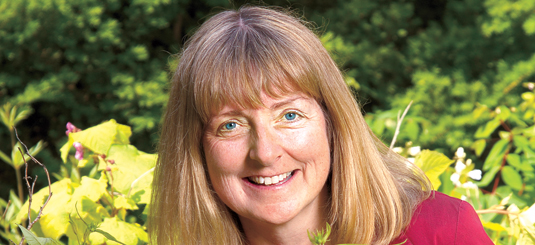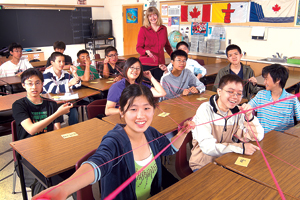|
Cheryl Care Patricia Rozema recalls Marguerite Van Die |

|
 |
Cheryl Carr believes in making learning active, hands-on and experiential – whether outside the class or in.
|
The students took Ballentyne through their impressive portfolio:
- teachers composting from the staff room
- a butterfly garden with native provincial plants that uses the compost
- cleaning staff using environmentally friendly cleaning products
- teachers and students turning off lights and powering down computers at the end of every school day
- teachers photocopying and printing on both sides of paper
- students leading a community clean up
- BEAT members presenting on ecological literacy to staff and students at Bethune and its feeder schools
- BEAT members running an after-school anti-idling awareness campaign and giving parents sitting in idling cars mock tickets that explain the impact of idling.
Bethune passes the audit with flying colours. Not only is it a gold school, it ’s also an EcoSchool leader in the board. Last year a busload of students and teachers from Lindsay’s I.E. Weldon SS in the Trillium Lakelands DSB visited Bethune to learn.
And let’s not forget the recycling centre. There’s a large open area near the front entrance full of materials to be recycled and reused. These include the usual pop cans and paper but there are also corks, which Girl Guides will use to make coasters, plastic-bag tags for elementary students to use as counting blocks, used stamps and greeting cards for elementary school crafts, and eyeglasses for donation to a program that serves vision needs in the third world. A collection centre for toxic materials takes batteries, printer cartridges, CDs and computer monitors.
It’s an impressive sight and it’s clear that students take their responsibilities seriously. And it’s not just the BEAT kids; it’s everyone in the school, staff included. Even community members take advantage of the centre. Why not? It’s a convenient place to drop off environmentally unfriendly items.
The BEAT student executive is filled with enthusiasm and admiration for their teacher-sponsor, for her behind-the-scenes contributions, her modesty and her tireless efforts.
“She’s a role model.”
“She has such integrity.”
“We all look up to her.”
“She inspires us to be passionate about causes we support.”
Out of class
Another of Carr’s passions is field trips. All of Bethune’s Grade 9 students go on a one-day field trip. With all sections of Grade 9 geography, that comes to two full days of students and teachers out of the school each May.
The tradition began in 1980, and Carr and her colleagues are committed to keeping it alive. Students, teachers and a host of volunteers visit Little India, Cabbagetown, the St. Lawrence market and the waterfront in Toronto as well as the Scarborough Bluffs, among other locations. Students sketch and take notes and pictures.
“They see things we have been studying all year, plus they learn about their own city,” says Carr. “It’s a vital component of our curriculum and we make sure it happens.”
Making sure it happens is becoming harder each year. As with many boards, budget cuts mean that Toronto DSB teachers no longer get supply-teacher coverage for field trips. But this doesn’t stop Carr. By creatively combining teacher timetables with help from former geography department head Ken Stamp, who volunteers to fill in, the required in-school coverage has been maintained.
Community volunteers and former students act as chaperones. Every Grade 9 geography student participates, which is on average 350 students. The ratio is usually about 20 students per chaperone.
 |
Committee members at the BEAT recycling centre – among the initiatives that earned Bethune CI a gold EcoSchool award
|
Are there problems? “The kids have no free time to wander and get lost,” Carr laughs. “There’s a tight and full itinerary. The bus drivers know to be on time and the students have an assignment to complete as they walk.”
Now in Grade 10, Kelson, Aroutin and Kai Wei were on the trip last May. All three boys enjoyed seeing the places they had talked about and studied in class. And it’s clear they all really like their teacher.
“Miss Carr is always so full of energy and enthusiasm. I was really tired after walking around Toronto all day but she was amazing; she never looks tired.”
“She always, no matter what, has a big smile on her face. I really think she likes teaching us.”
Tech connection
Having good relationships with parents and guardians is important for Carr. She involves them in planning class excursions, then e-mails the itinerary, the assignment and behaviour expectations. She keeps in touch by phone and e-mail throughout the year and does the same with Special Education and ESL teachers and other support staff.
“Everyone involved in educating our students is in the loop,” she explains. “Taking a team approach is essential to build in as much success as possible.”
She also believes in the importance of experiential learning, and her hands-on approach extends to the use of technology wherever possible.
Like all Grade 9 students, Carr’s read about latitude and longitude in their textbooks. Then Bethune’s Grade 9s apply the theory using hand-held Global Positioning System (GPS) devices.
Once students have mastered the technology, they are ready to start geocaching – an adventure game for GPS users. Caches are hidden all over the world with location co-ordinates posted on the Internet. The students use GPS devices to find caches and add something to them that reflects or represents their school.
“The kids love it. After all, who can resist a treasure hunt?” asks Carr. “As well as having fun, they work in teams and practise bearings, scale, latitude and longitude.”
Carr also integrates the Parks Canada web site into her curriculum. The interactive and highly detailed site offers a huge variety of Grades 3 to 12 teaching and learning activities. Classroom-ready fact sheets, lesson plans and contests are tied directly to the provincial curriculum. Much of the material takes a hands-on, creative and fun approach to teaching subjects, including art, geography, biology, civics, physical education, science and technology, mathematics, language and social sciences.
In the fall, every Grade 9 academic geography student at Bethune participates in the national parks poster contest. Students create a poster using the concept of ecological integrity to reflect an existing Canadian national park. The poster must represent the features and processes that naturally occur within that park’s ecozone, so students must visually and creatively apply what they have studied in class.
Carr’s passions fuel her teaching and inspire her students at all levels to get excited about learning.
“She’s always e-mailing us articles she thinks we’d be interested in. She’s got an eye out for us because she wants to help broaden our perspective on what’s happening around the world, not just here at home,” explains Rebecca, a student in Carr’s Grade 12 world issues class. “She’s passionate about world issues and her students come to feel the same way.”
“Ms. Carr is someone who is kind, passionate, enthusiastic, fun and organized,” says Grade 12 geography student and BEAT executive member Betty. “She is a role model for her students. She’s always on top of everything and she’s well prepared for any unforeseen event. In essence, she’s a perfect mom.”
Cindy Lim, a former Bethune student who graduated in 1986, recently left a successful career in marketing to attend OISE and is hoping to become a geography teacher.
“I’m going to craft my approach to teaching based on Miss Carr’s,” says Lim. “I know it’s going to take a lot of work to make it look so easy, but she has inspired me to make teaching my career.
Cheryl Carr’s teaching philosophy
- Be the teacher you would like your own children to have.
- Model the behaviour you would like to see in your students.
- Recognize different learning styles and try to teach every major concept at least two different ways.
- Keep your sense of humour; laugh every chance you get; do not take yourself too seriously.
- Be passionate about your lessons.
- Be flexible – do not let a teachable moment go by because you have a fixed lesson plan.
- Stay in touch with parents.
- Start each lesson with a hook, something that makes your students curious about what is coming next.
- Make connections between the lesson and the students’ lives and with the world outside the school.
- Whenever possible, make learning active, hands-on and experiential.
- Make learning fun for your students and make sure that you are having fun as well.
Prime Minister’s Awards
The Prime Minister’s Awards for Teaching Excellence honour outstanding and innovative elementary and secondary school teachers in all disciplines.
For nominations or information visit www.pma-ppm.gc.ca.
Resources
Web sites
EcoSchool website
Parks Canada’s Teacher Resource Centre
GPS cache hunt site
Daytrippers
Like most schools, Dr. Norman Bethune CI does a lot of fundraising for day trips. But fundraising alone may not be enough at lower-income and isolated schools in Ontario, so Daytrippers Children’s Charity is helping to make class excursions a reality for many students in the province.
Information and applications for funding are available online at www.daytrippers.org or call 416-830-9966.










